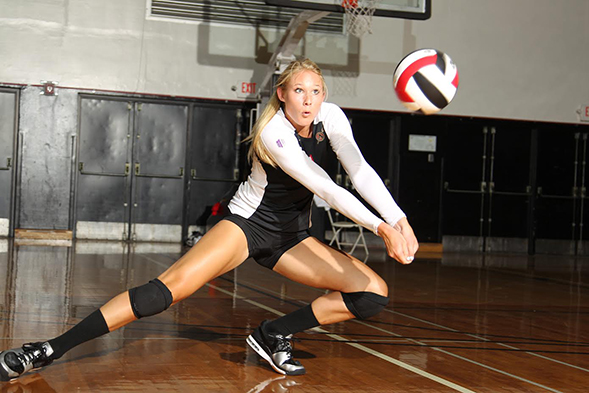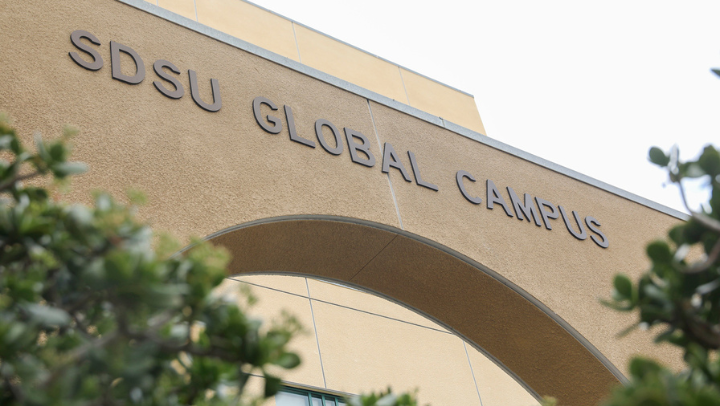Advantage Aztecs
SDSU helps student-athletes go pro in careers other than professional sports.

This story appears in the fall 2016 issue of 360: The Magazine of San Diego State University.“Aztecs Going Pro is a more holistic approach to developing our student-athletes and setting them up for success.”
Every hour a student-athlete spends practicing or playing their sport is an hour that can’t be devoted to valuable career-building activities like internships and community service. These lost hours can mean missed opportunities, as most student-athletes will pursue careers outside of professional sports after graduation.
To give student-athletes an advantage, San Diego State University has created Aztecs Going Pro, a program that helps prepare them for professional careers.
Aztecs Going Pro began in 2015-16 with mandatory classes for freshmen. A class for sophomores was added this year. By 2019, juniors and seniors will fall under its umbrella, providing for the first time a four-year schedule of classes focused on pragmatic information for student-athletes.
Created by Bobby Smitheran, senior associate athletic director for Student-Athlete Academic Support Services, the program provides a platform for experts from across campus to speak in class about academics, social issues, financial literacy, leadership, health, internships, networking, resume-writing and job-interviewing skills.
“Aztecs Going Pro is a more holistic approach to developing our student-athletes and setting them up for success,” Smitheran said.
For many years, student-athletes at SDSU were required to take a class as freshmen to help their transition to college. The seminar covered time management, learning strategies and campus resources.
“It was more of a how-to-succeed-in-college class,” said Smitheran, who joined SDSU in 2008 as student-athlete services coordinator and also served as director of football operations. The more time he spent with student-athletes, the more he realized that the ideas and concepts embedded within that class could be spun into a program to help launch student-athletes’ professional careers.
So when Smitheran moved into his current position three years ago, he was encouraged by former Athletic Director Jim Sterk to put his ideas into practice. He developed the series of classes that comprise Aztecs Going Pro—Freshman Foundation, Sophomore Success, Junior Journey and Senior Suit Up.
First-year topics include study skills, time management, community living, social media awareness, plagiarism and academic integrity, plus discussions about sexual assault and alcohol/drug abuse and how to maintain NCAA eligibility. Sophomores are introduced to financial literacy, career services and professional etiquette. Juniors and seniors discuss resume-building, career exploration, graduate school, networking, interviewing skills and life after athletics. Seniors also attend a job fair.
Last year, volleyball player Ellen Novotny, (’16), and football player Aaron Boesch, (’16), found their Senior Suit Up experience to be invaluable. Novotny, an accounting major, met representatives from Foresters Financial at the job fair and was hired as a financial planner.
Boesch, an interior design and architecture major, received a job offer at the fair, but eventually declined it. However, he used the skills gained from that experience to approach representatives of Johnson & Jennings General Contracting, who hired him as project engineer.
For Aztecs Going Pro to effectively help student-athletes prepare for life after college, it’s important that classes are mandatory, Boesch said. Athletes have a tendency to put sports first, claiming they don’t have time to add one more thing to their busy schedules. But the program teaches them to start thinking beyond the next practice, the next game, the next season, he said, to recognize their future potential.
Smitheran is excited that Aztecs Going Pro introduces athletes to programs across campus and to each other: rowers, basketball players, lacrosse athletes and swimmers all attend class together. And it’s a selling point for SDSU in its recruitment efforts.
“(Coaches) can go into a recruit’s house and talk to parents about not only the academic piece, but also how we are going to handle the social piece, how we are going to prevent your son or daughter from moving back in with you once they graduate,” said Smitheran with a laugh. “You want to make sure they have the skills they need to step out in the world and be successful.”



